Vitamin D Foods – Sources, Benefits & Deficiencies

Parul Dube
April 6, 2023

Parul Dube
April 6, 2023
Well-known as the “Sunshine Vitamin”, vitamin D is a nutrient and a hormone produced by the body. It is vital for calcium absorption.
In addition, it is instrumental in promoting bone growth and bone remodelling. Thus, you need to include vitamin D food in your diet. It will help promote your bone health, modulate cell growth, boost the immune system and prevent inflammation in the body.
Sun is a natural source of vitamin D. Just a few minutes in the sun can significantly boost your vitamin D levels. However, despite being easy to absorb, more than 40% of people worldwide suffer from vitamin D deficiency.
Vitamin D deficiency can lead to brittle bones, rickets, osteomalacia, a weakened immune system, depression, cardiac-related issues, poor skin and hair health.
It is easy to maintain our vitamin D reserves during summers. However, a lack of sunshine during winters can lead to a vitamin D deficiency. Even COVID and lockdown have led to vitamin D deficiencies. That is because people stay indoors for days, with less or almost no sun exposure.
Therefore, the best way to keep your vitamin D levels in check is to include vitamin D rich foods in your daily diet. Vitamin D rich foods will help you restore and maintain your nutrition levels and keep you healthy. If you are confused about vitamin D foods, do not worry. This article covers everything you need to know about it.
Vitamin D is a pro-hormone. It means that our body converts it into a hormone. It is also a fat-soluble vitamin. It means you need fats in your body for proper absorption of vitamin D. Since vitamin D maintains calcium and phosphorous levels in our bodies, it is an essential vitamin for good bone, muscle, and teeth health.
Vitamin D is a combination of five substances, out of which two of them are essential for us. These are:
Vitamin D2 (Ergocalciferol) – Vitamin D2 is naturally present in mushrooms that receive sufficient sunlight. Therefore, it is one of the best Vitamin D2 sources for vegetarians.
Vitamin D3 (Cholecalciferol) – Our body makes Vitamin D3 when the cholesterol in our skin comes in contact with the sunlight. Vitamin D3 is also present in some animal food products.
The standard measuring unit to measure your daily dose of Vitamin D is micrograms(mcg) or international units(IU). One mcg of vitamin D is equal to 40 IU.
Vitamin D requirement as per Age and Gender
| Population Group | Vitamin D Recommendation |
|---|---|
| Infants 0-12 months | 400 IU or 10 mcg |
| Children 1-18 years | 600 IU or 15 mcg |
| Adults up to 70 years | 800 IU or 15 mcg |
| Adults over 70 years | 800 IU or 20 mcg |
| Pregnant or Lactating Women | 600 IU or 15 mcg |
Sunlight is the best vitamin D. Just by spending 10-15 minutes in the sun; you can boost your vitamin D levels. That is because when sunlight hits our skin, the fat or cholesterol present in our skin converts it into vitamin D.
While sun exposure is more than sufficient for maintaining vitamin D levels in the body, consuming certain Vitamin D-rich foods are equally essential. Along with food, people with severe vitamin D deficiency can also take vitamin D supplements to fulfil their daily requirements.
Food accounts for just 10% of the total vitamin D present in our body. However, people who do not get enough sun exposure or have dark skin can rely on vitamin D rich foods. It will help them improve their vitamin D quotient.
You can get vitamin D from both vegetarian and non-vegetarian foods. Here is a list of foods high in vitamin D.

Kale is popularly known as the king of all leafy vegetables. That is because of its tremendous nutritional benefits. Scientifically called Brassica oleracea var. sabellica, it is widely available worldwide.
Kale or leaf cabbage is also a source of vitamin B and D. It has excellent nutritional values, which helps in brain development. In addition, it improves the immune system. Kale contains kaempferol and quercetin, excellent antioxidants which are very good for brain functioning.
Nutritional values for 100 grams of kale are as follows:
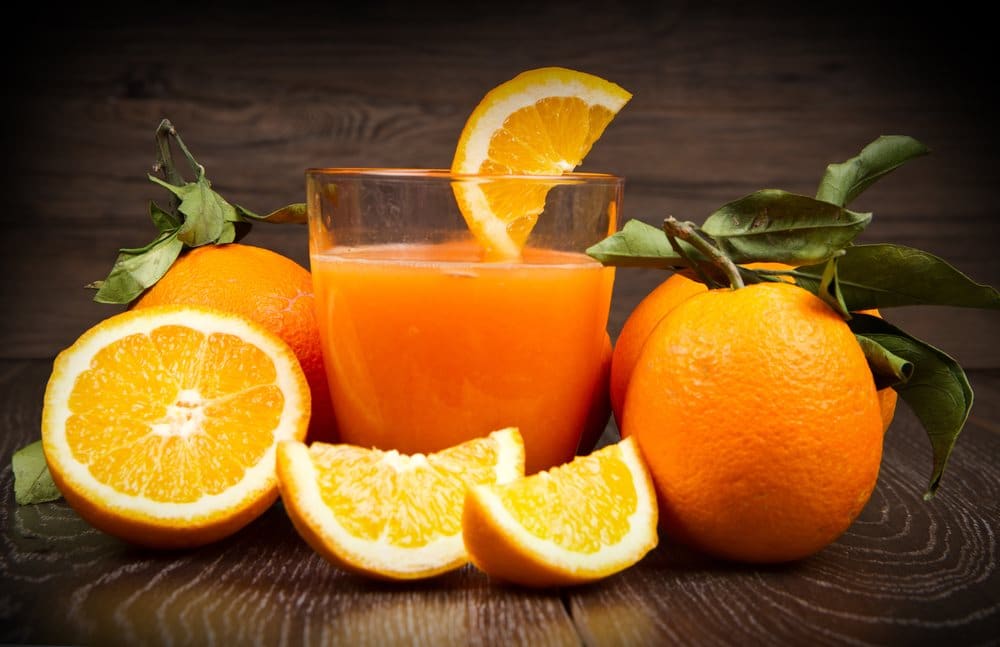
Orange is scientifically named Citrus X sinesi. It is widely available almost everywhere, and you can have it on the go. It is rich in antioxidants which help the body fight infections.
Orange is a rich source of vitamin D. Hence, it protects our cells from damage. In addition, it helps our body make collagen. Collagen heals wounds and makes skin smoother.
Read more: Is Orange Good for Weight Loss?
In addition, it absorbs iron to fight anaemia and boosts our immune system. 1 glass of fortified orange juice contains 137 IU of vitamin D. You can drink a glass of juice to add up to our daily dose of vitamin D.
Nutritional values for 100 grams of orange are as follows:
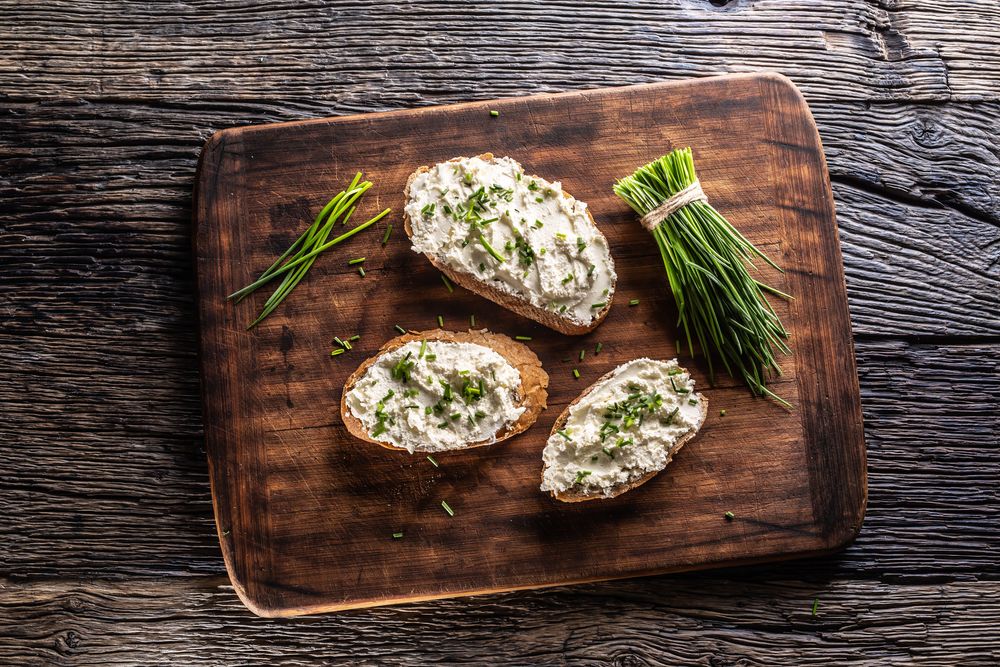
Cheese is one of the most delicious additions to our diet. It has a high phosphorus, protein, fat, vitamin, and calcium content. So, if you like cheese, eat it raw. You can also add cheese to your sandwich or spread it on your bread. However, you should consume cheese in moderation.
Read more: Cheese – Health Benefits, Nutrition and More
One hundred grams of cheddar cheese contains 24 IU of vitamin D, feta contains 16 IU, and swiss cheese contains 20 IU. Though it differs in amount, cheese can be called a good source of Vitamin D.
Read more: Is Cheese Good for Weight Loss? Let’s Find Out
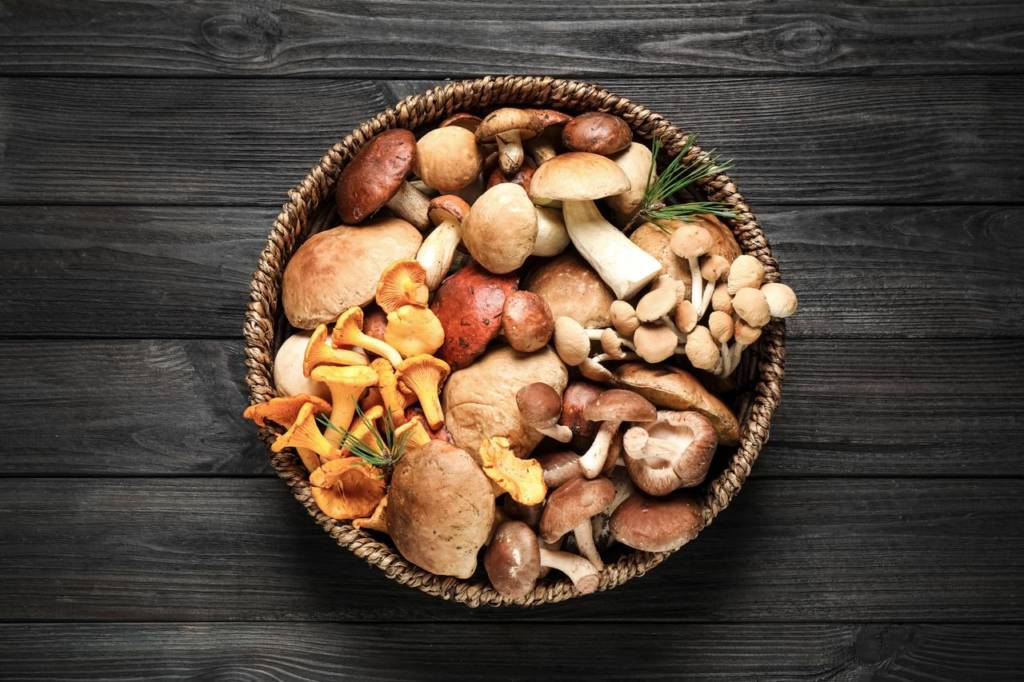
The scientific name of the mushroom is Agaricus bisporus. It is widely available all over the world. Sun-dried mushrooms are an excellent source of vitamin D. Most mushrooms do not contain vitamin D naturally.
They need UV light treatment to produce vitamin D. The amount of vitamin D present in a mushroom depends on the amount of UV light it receives.
Nutritional values for 100 grams of mushrooms are as follows :
236ml fortified milk has 115 to 124 IU of vitamin D. Plant-based soy or almond milk contain similar amounts of vitamin D. You can have them as delicious shakes or smoothies and improve your calcium and vitamin D levels.
Yoghurt is not only good for the gut, but the fortified variety can provide you with 10–20% of your daily vitamin D. You can include yoghurt in your meals in different forms for a healthy–balanced diet.
Unsweetened and fortified oatmeal can add a solid dose of Vitamin D to your diet. It gives you 40 IU of vitamin D per serving. It may provide more if you choose a more heavily fortified cereal.
Raisin Bran is the best example which has 60.2 IU per cup. If you add fortified low-fat or fat-free milk to your bowl, you can gain an extra 60 IU per half-cup. You can make a breakfast cookie too by including fortified cereal and vitamin D fortified margarine.
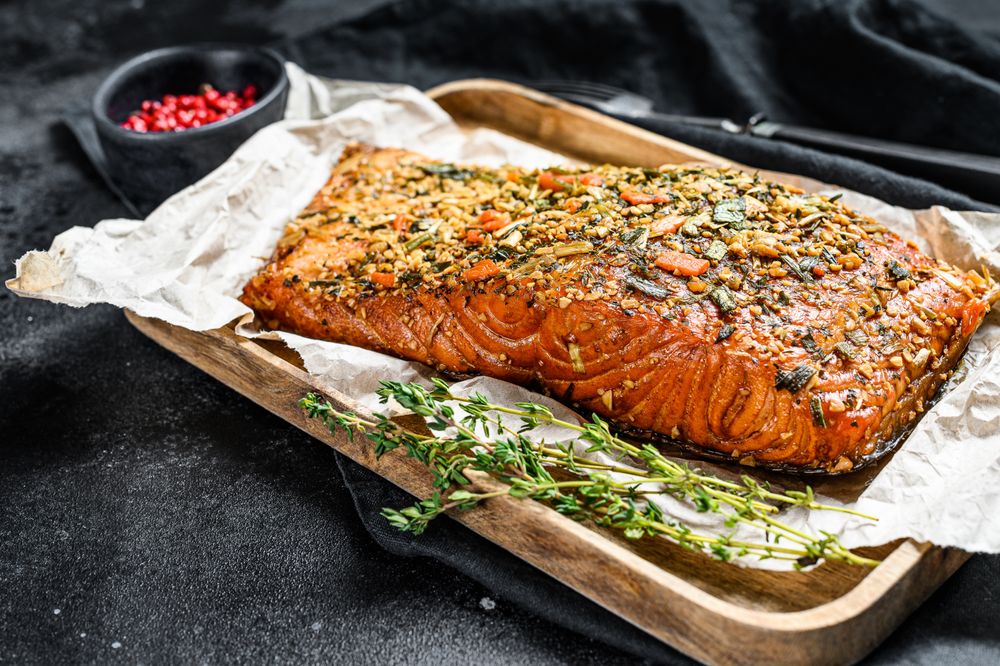
Salmon is a good source of high-quality lean protein and omega-3 fatty acids. Additionally, it is also rich in vitamin D. Cooked salmon has 447 IU of vitamin D. Add salmon to your diet to increase your vitamin D levels.
Read more: Salmon Fish: Benefits, Nutritional Value & Recipes
Nutritional values for 100 grams of salmon are as follows :
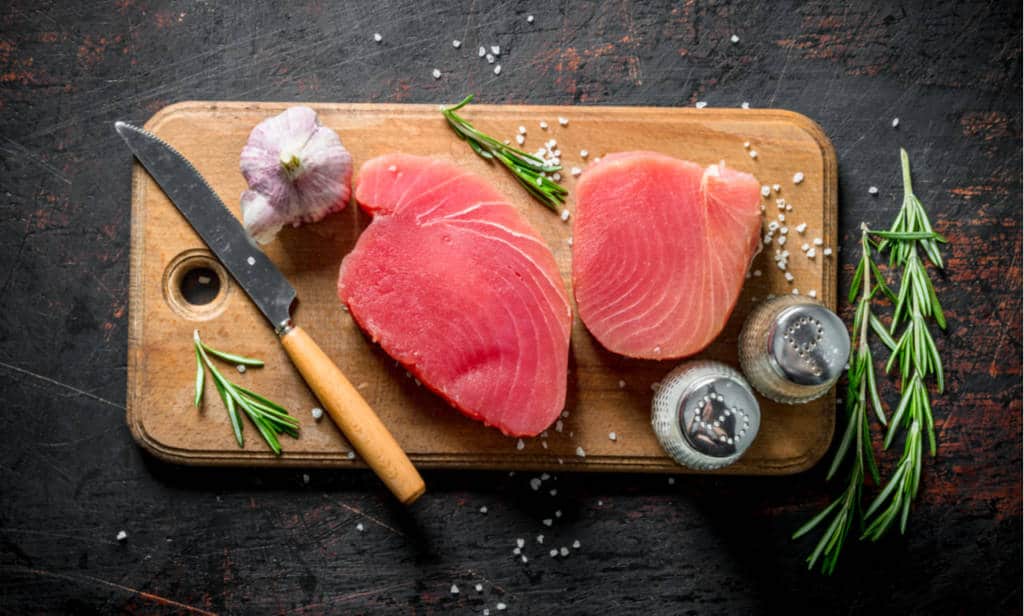
Three ounces or 85 g of tuna contains 154 IU of vitamin D. Having a tuna sandwich or tuna salad in your lunch can take up your vitamin D reserve.
Nutritional values for 100 grams of tuna (Canned)are as follows :
Eggs are a breakfast staple in every household (apart from vegan and pure vegetarian homes). The yolk in the egg is loaded with vitamin D.
One egg yolk contains 41 IU of vitamin D. Eggs are also a great source of calcium, protein, zinc, and essential minerals. Therefore, you should eat eggs regularly to give yourself a good dose of vitamin D.
Nutritional values for one egg are as follows :

Cod liver oil is incredibly nutritious. It is extremely rich in Vitamin A and D. A single teaspoon of cod liver oil provides approximately 113% of your daily vitamin D requirements.
The nutritional value of 1 teaspoon or 5ml cod liver oil is as follows:
According to a study, vitamin D plays an essential role in improving bone and muscle health. It is because vitamin D helps regulate calcium. It also maintains phosphorus levels in the blood.
These are some critical factors to keeping bones healthy. In addition, our body needs vitamin D to allow the intestines to stimulate and absorb calcium. These functions are imperative to reclaim calcium; otherwise, the kidney excretes it.
Vitamin D deficiency can cause rickets among children. Similarly, vitamin D deficiency manifests as osteomalacia or bone softening in adults.
Vitamin D supports the immune system and fights harmful bacteria and viruses. It also helps to keep influenza, flu, and other respiratory illnesses at bay.
It serves as a pharmacy resource too. Vitamin D helps to reduce inflammation. In addition, it helps in metabolising enzymes and fights infections in the body.
According to research, vitamin D receptors and activating enzymes are present on the surface of our white blood cells. Thus, vitamin D balances the activities of the immune system.
In addition, if there are too many activities, autoimmune diseases set in. Whereas, if there are no frequent actions, chances of infections increase.
As per a study, vitamin D helps the body absorb calcium and phosphate, crucial for building strong tooth enamel. It boosts mineral density and absorbs, carries, and deposits calcium in the bones.
In addition, it helps restore the enamel layer of teeth if it erodes due to nutrient deficiency. It repairs damaged dentin, part of the tooth beneath enamel and cementum. People suffering from vitamin D deficiency have a higher risk of tooth decay.
As per research, vitamin D supplementation helps lower the average blood sugar levels in people who have type 2 diabetes. Supplementation for more than 12 weeks at more than 1000 IU/day may be most beneficial.
Vitamin D helps in the proper functioning of hormones insulin and glucagon. Therefore, it helps maintain an appropriate balance of blood glucose levels in the body.
An average to moderate amount of vitamin D helps keep proper glucose absorption in the body. Hence, normal vitamin D levels lower the risk of diabetes and help maintain good health.
Depression is a serious issue. It is connected with our mental health, and it is challenging to detect it. According to a study, vitamin D deficiency can cause depression and mood swings.
Similarly, high vitamin D levels can significantly boost your mood and improve your mental health. Therefore, to have adequate vitamin D, don’t confine yourself to the walls of your house. Outdoor physical activity during the early hours of the day is best for good vitamin D absorption in the body.
Research shows that people living in southern latitudes with high sunlight exposure have lower cancer risks. That is because vitamin D also slows down the formation of a few types of tumours and cancerous cells.
In addition, it helps in good immunity, ultimately reducing risks of degenerative diseases like cancers, arthritis, Parkinson’s disease etc. Therefore, vitamin D is a vital vitamin that helps maintain a healthy body.
The World Health Organization (WHO) has declared obesity an epidemic of the 21st century. According to research, obesity increases the risk of vitamin D deficiency.
That is because it assists in the weight loss process. It alters the storage and formation of fat cells. Furthermore, it increases the levels of serotonin and testosterone. If not produced in required amounts, these hormones hinder your weight-loss efforts.
As per a study, your baby needs Vitamin D to absorb calcium and phosphorous. These, in turn, help them build strong bones and teeth. Conversely, if a baby lacks adequate vitamin D, they may suffer from rickets, a condition that causes softening and weakening of bones.
But, do remember, sun exposure, an essential source of vitamin D, is not recommended for babies. Hence, supplements are the best way to fulfil it.
Everybody needs vitamin D to absorb the right amount of calcium and phosphate. In addition, it is imperative in pregnancy to develop a baby’s bones, teeth, kidneys, heart and nervous system.
As per research, pregnant women deficient in vitamin D may have a greater risk of developing preeclampsia and giving birth preterm.
Vitamin D is a fat-soluble vitamin. It is stored in the fat cells in our body. Hence, it is imperative to add enough vitamins to our daily diet. In addition, add limited amounts of ghee or olive oil. Ghee and olive oil can do wonders in vitamin D absorption. In addition, they also help recover from vitamin D deficiency.
Insufficient amounts of vitamin D in the body can lead to vitamin D deficiency. Usually, people with dark skin or above 50 years of age are more susceptible to developing vitamin D deficiency.
However, a study suggests that pigmentation reduces vitamin D production in the skin. The reason is that melanin in dark skin absorbs ultraviolet radiation and reduces UVR available for vitamin D synthesis. Therefore, sufficient amounts of vitamin D are essential to keep you healthy and strong.
Severe vitamin D deficiency can lead to chronic health problems, such as:
Though vitamin D deficiency symptoms are pretty vague, many people do not even realise they have it unless they get a blood test. However, paying attention to specific symptoms can help you identify whether or not you are suffering from vitamin D deficiency. These symptoms include:
Vitamin D is an underrated vitamin due to its easy availability. One of the reasons is the lack of awareness regarding its importance. Though sunlight is an excellent source of vitamin D, too much sun exposure can also be harmful and lead to skin cancer. However, 10-15 minutes of sun exposure, 2-3 times a week, is more than enough to fulfil your vitamin D requirements.
Though sunscreens are also essential for protecting your skin, do not wear them excessively. When you are in the sun, or the sun rays enter your car or office, they cannot provide you with vitamin D.
Sunscreens only help block the sun’s UV rays. Therefore, if you want to take vitamin D naturally, the early morning hours after sunrise are perfect for soaking in the sunlight. If you live in cold regions or suffer from health problems, then consult a doctor regarding vitamin D supplements to avoid its deficiency.
A. Although bananas do not have vitamin D, they are rich in magnesium, which helps activate vitamin D in the body.
A. The best form of vitamin D is vitamin D3 or cholecalciferol. Our body makes vitamin D3 from sunlight.
A. Yes, vitamin D is a mood booster. Unfortunately, people with low vitamin D often suffer from low mood and depression.
A. Yes, a good amount of vitamin D during the day can give you a good night’s sleep. But, conversely, lack of vitamin D may lead to poor sleep quality.
A. Fortified almond milk is an excellent source of vitamin D. A single cup of Vitamin D contains 25% of your daily vitamin D requirement.
A. Yes, a lack of vitamin D can result in hair loss.
A. Any deficiency in vitamin D can contribute to premature greying.
A. Vitamin D deficiency can cause several problems like low bone density, rickets and anxiety disorders.
A. Proper vitamin D can help enhance your hormones and reduce body fat.
A. Consuming food like tuna-fish, milk, and even vitamin D supplements can help fulfil your body’s daily vitamin D requirements. Even exposure to sunlight can boost vitamin D.
A. Cereals like coco pops, rice Krispies, frosty are rich in vitamin D.
A. 100 gm of coco pops pebbles have 333 IU of vitamin D. Hence, it is the cereal with maximum vitamin D.


Thank you for publishing the informative article on “Vitamin D Foods” on your blog. The article provided valuable insights on the importance of Vitamin D for our health and the food sources that can help us meet our daily requirement. I found the article well-structured and easy to understand. Your efforts in creating such informative content are greatly appreciated. Keep up the good work!